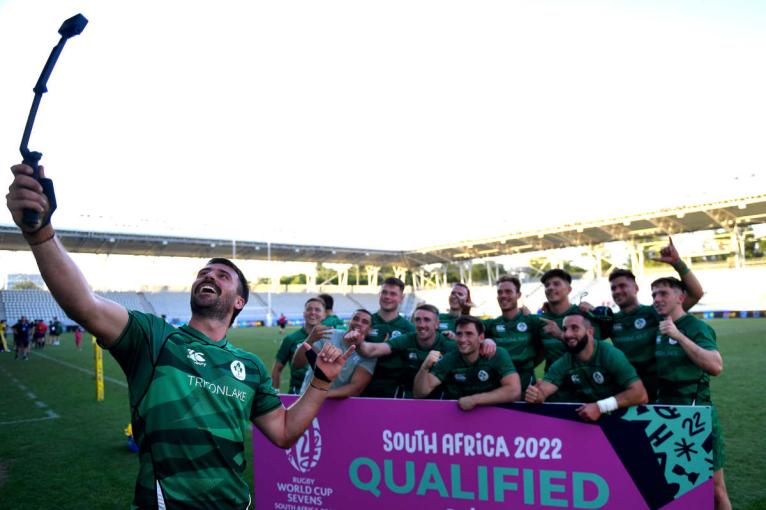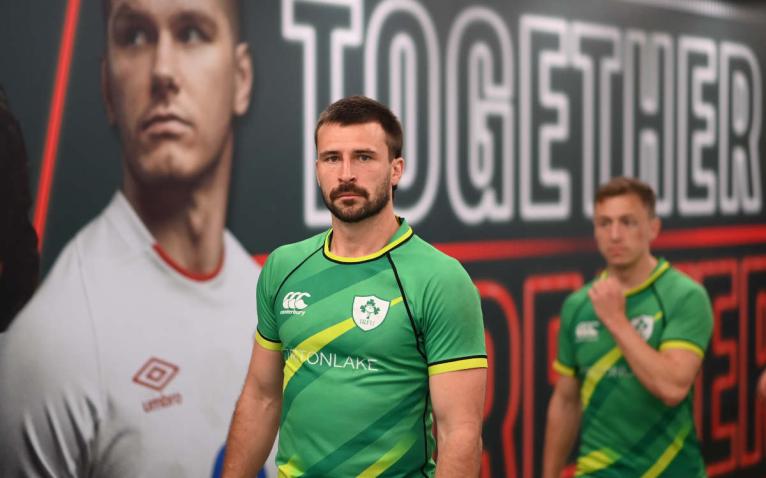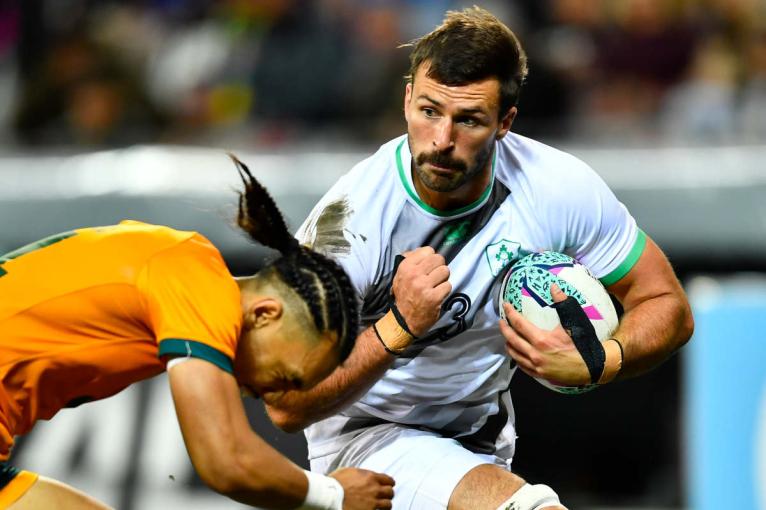June, 2015. The mercury touched 93 and the humidity came close to matching it. A moment he will never forget and will never want to.
He was in a place called Zenica, a city at the end of the rugby world as well as the alphabet.
A day earlier he and his team had visited the spot in Sarajevo where Franz Ferdinand was assassinated, arriving on history’s doorstep. Now they were about to make their own bit of history, the first Irish Sevens team to play an international since the IRFU relaunched the programme.
You won’t find Zenica on too many tourist brochures, the smog from the city’s steel factory encircling the Stadion Kamberovica Polje and its solitary stand. Potholes, caused by the dents left from a hammer competition in an athletics meet, pockmarked the pitch.
Eight small words, yet very big ones.

As he watched the groundsman line the pitch, and wondered when they were going to erect the posts for the following day’s tournament, he thought back to where he’d come from. Success was like smoke. He could see and smell what it looked like, without ever being able to grasp it. UCD, a team in the All Ireland League, provided an outlet after Munster had released him from their academy, but he was stagnating rather than progressing.
“My rugby journey is a very different path to most,” McNulty says. “You often hear of things not working out for players in academies; and then they go off to another club, make progress and get international recognition.
“For me, it hasn’t been like that. The Sevens came about almost by accident. It was my mother who saw the ad in early 2015 – that the IRFU looking for trailists.
“The landscape has changed so much over the years, from being amateur in the early days, training twice a week, to where we are now. That first trip, in Zenica, was unbelievable. Like, they didn’t have an ice bath; they had a paddling pool just off the pitch. The opposition players asked us for the words to our national anthem because they liked the tune so much.
I was a bit fed up after leaving Munster in 2014. I certainly wasn’t in love with rugby.
“We had so much fun. And as the years went on, and the team got better, the games got harder but the fun never stopped. This has changed my life. I was a bit fed up after leaving Munster in 2014. I certainly wasn’t in love with rugby.”
Yet in 2015 he was falling in love with Zenica. The backdrop may not have been The Stade de France; the opposition may have been supping cold bottles of beers in between long shifts under a burning sun, like those inmates tarring the roof in The Shawshank Redemption, yet there was a seriousness to their purpose.
Ireland’s rugby Sevens programme had been dormant for six years when it was relaunched in 2015. This group of men would later be called The Originals. But at this stage of their lives, their rugby careers had sunk so far below the surface that bubbles didn’t even show. Europe’s Division C is as unglamourous as it gets in rugby. But this is where McNulty and Ireland were starting from. He knows where he wants it to end.
McNulty sent some NZ players to Madrid early 👀#HSBCSVNS | #HSBCSVNSSGP | @nz_sevens pic.twitter.com/bVU43eowqW
— Rugby Sevens (@SVNSSeries) May 5, 2024
“I’d be a liar if I said I didn’t think about walking through arrivals at Dublin Airport with an Olympic medal,” he says.
In Irish sport, there is this tradition which crosses borders in terms of code and geography. A trend that started with Stephen Roche winning the 1987 Tour de France has continued ever since and peaks every four years when Irish athletes come home from the Games with history and medals in their hands. That’s what he wants for himself.
“You don’t want to ever get too far ahead of yourself but to come home and be on home soil with everybody waiting for you, that would be fantastic.”
He has walked through before with medals, having played more matches – 181 – than any other Irish rugby player in the World Series. Yet neither he nor most of his team mates are widely known in the rugby world.
The exception is Hugo Keenan, who – like fellow Ireland 15s internationals such as Tadhg Beirne, Robert Baloucoune, Shane Daly, Adam Byrne, Nick Timoney and Jimmy O’Brien – graduated from the Irish Sevens programme to go on and get paid a considerably higher salary in front of considerably higher crowds.
Without being prompted, all seven players regularly reference their experience in a Sevens shirt. “The making of me,” said Baloucoune once. “I loved it,” said O’Brien. “You learn so much,” remembered Beirne.
McNulty is arguably Ireland’s best Sevens operater, ferociously strong, blindingly quick, and the possessor of a high rugby IQ.
Keenan, though, wanted to more than just reflect, deciding to take a sabbatical from Leinster after their Champions Cup final defeat in May to sacrifice Ireland’s tour to South Africa for Ireland’s Olympic quest. “Hugo’s an amazing addition; a brilliant player, a brilliant fella, too,” says McNulty.
He isn’t the only one. McNulty is arguably Ireland’s best Sevens operater, ferociously strong, blindingly quick, and the possessor of a high rugby IQ. Then there is Terry Kennedy, the 2022 world rugby sevens player of the year. Like McNulty, Kennedy was one of The Originals, along with winger, Jordan Conroy, who moves quicker than gossip through a small town.
Together this group of rugby orphans made something of themselves. They were a team who came from nowhere, rehabilitating their careers in obscure settings, often playing in front of small crowds, then graduating to bigger stadiums. Along the way, they saw Red Square in Moscow, the Pacific Ocean in Chile, Oktoberfest in Munich, Silicon Valley in California, the Gardens by the Bay in Singapore.

And step by step, they moved up the ranks from Europe’s Division C to the Rugby Europe Grand Prix Series, making it into the World Series in 2019, to the Tokyo Olympics two years later.
Along the way, milestones were reached, such as the victory in the Moscow Sevens in 2017. That tournament began at 10am on a Saturday, Ireland only landing in the Russian capital 15 hours beforehand.
“We got there so late that Billy Dardis nearly missed the captain’s photo. He literally stepped off the team bus, was handed a jersey and walked straight into the stadium for a picture.
“There were loads on the line in that tournament. From a prep point of view, it was awful. We should have been there on Wednesday, rather than Friday. So, we were like ‘what is going on? Are the IRFU not taking this seriously?’”
McNulty’s thirst for travel was driven by his two passions in life, sport and photography. If Red Square was the urban wonder that he can never forget, then other snapshots from the 65 countries he has visited will never leave him.
But they won that tournament and kept on winning. No one could ignore them. In 2018, the amateurs received their first professional contracts, worth a basic €18,000 per year with bonuses of €500 for participating in each of the 10 World Series tournaments. It isn’t going to make any of their players wealthy.
Life was rich, though.
McNulty’s thirst for travel was driven by his two passions in life, sport and photography. If Red Square was the urban wonder that he can never forget, then other snapshots from the 65 countries he has visited will never leave him. A couple of months ago he landed in Ghana and saw the Cape Coast Castle where slaves walked through the gates for a life of torture.
Then there were safaris in Kenya and Uganda, the wonder of being inside a vehicle while a leopard walked underneath it, of being 15 metres away from a pride of Lions, similarly close to herds of elephants and cheetahs.
“It opened me up to a new style of photography. Safaris have been some of my favourite moments ever.”
The rugby adventure has been equally memorable. There were the fifth place finishes in the World Rugby Sevens Series, the qualifications for Tokyo and Paris, the victory this year over New Zealand. This year they also finished runners up in the Singapore 7s. A medal in Paris is a definite possibility.

“What we have loved about the last nine years is the fact we have been able to grow and experience the game of Sevens at our own pace.
“We were better off not being thrown in at the deep end too early, being free to play against teams who were not as good, and learn from that experience.
“Qualifying for the World Series in 2019 was the gateway moment. Without that it is hard to imagine if anything else would have opened up such as the medal at the South African World Cup, beating France to qualify for Tokyo, beating New Zealand this year. That solidified the purpose of the programme. ‘We have got everyone now,’ we said after that win. No one scares us.”
This Sevens programme has been around since 2015 which is not long in the grand scheme of things, seeing as the IRFU was formed in 1879
The new found consistency stems from their work with high performance strategist, Darragh Sheridan, a former footballer with Aston Villa and Galway United. Under his watch, the team have rewritten their cultural and leadership values, self-analysing on the move.
“We are a very new team in terms of how long we have been put together. What I mean by that is that this Sevens programme has been around since 2015 which is not long in the grand scheme of things, seeing as the IRFU was formed in 1879.
“We wanted to create a structure that would get us better results. You are always learning in this game.”
Paris is their final exam.


Comments
Join free and tell us what you really think!
Sign up for free